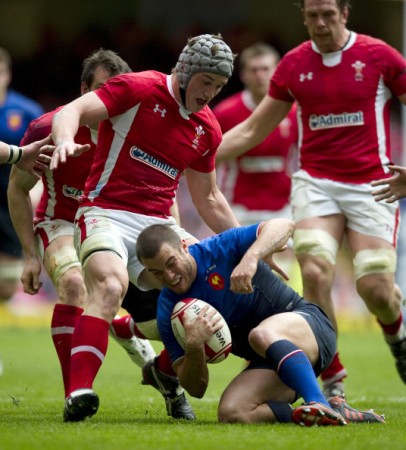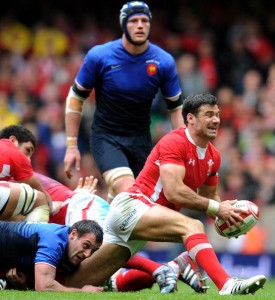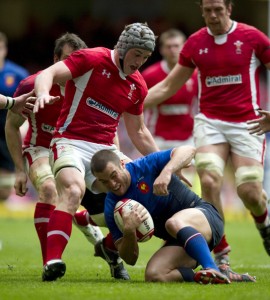
Green grass of home: Wales wing Alex Cuthbert slides over to score the only try of the game against France
By Paul Williams
Wales won their third RBS 6 Nations Grand Slam in eight seasons when beating France on Saturday. It was a wonderful occasion in Cardiff’s Millennium Stadium. Here’s my in-depth analysis on the their performance in the final round…
Lydiate’s tackling, again
If you spend every waking moment of the rest of your life watching rugby, I doubt you will see a finer display of tackling than Dan Lydiate provided against France – it was truly remarkable. Lydiate led the Welsh team’s tackle count with ten, missing none. But it wasn’t the tackle count that was so impressive. In truth Wales had to make very few tackles (63 compared to France’s 109) – it was the technical perfection of the tackling that was so impressive. Lydiate is redefining the modern tackle. Whilst many back-row forwards are obsessed with the power of the hit, Lydiate is obsessed with the speed of it. His sole intention is to get a player on the floor as quickly as possible. It is a very clever ploy. The quicker you can get the ball-carrier on the floor, the quicker you can steal the ball. Lydiate definitely gets my vote for Player of the Tournament.
Priestland back in control
Having lost control against England and Italy, Rhys Priestland chose the perfect moment to regain it – he controlled the game admirably against the French. But it wasn’t just his ability to guide Wales home to a Grand slam that was so reassuring, it was the manner in which he did it. Traditionally, Priestland is renowned for his hands. His accurate and sympathetic passing has been one of the main reasons why the Welsh back-line has functioned so well in the World Cup and the Six Nations. Yet on Saturday he decided to do it all with his feet.
Priestland displayed a wonderful array of tactical kicking against France and allowed Wales to control 65% of the territory. His kicks were clever and executed as a response to what he saw on the field – unlike his opposite number Lionel Beauxis whose kicks had been pre-determined in the changing room. The Scarlet’s outside-half executed some fantastic ‘wipe kicks’ against the French. These low, fizzing diagonal balls almost always resulted in the French defender having to gather the ball near his try-line and, more importantly, near the touch line – the resulting clearing kicks needing to be made at very narrow angles and often resulting in territorial gains for Wales. Of course, not all of Priestland’s kicks were perfect, and there will be those who think that any kick is simply a waste of possession. However, Saturday’s performance showed that Priestland can control a game with his boot, which will be vital when Wales tour the rock hard grounds of Australia in June, where the ability to control the trajectory and bounce of a rugby ball could decide matches.
Rock-solid set-piece
Wales’ set-piece against France was more than stable. Wales won 77.8% of their lineout ball and whilst this number falls below the 85-90% that the coaches would have been looking for, Wales actually won more lineout ball against France than they did against any other team in the tournament (14 in total). The lineout completion stat is slightly skewed because Rhys Priestland’s kicking tactic resulted in Wales having more lineouts against France than in their previous games (18 in total).
Whilst Wales may have lost four lineouts, the quality of the ball that they did win was very clean. Wales simplified their lineout against France and reduced the amount of Strictly Come Dancing-style movements from the jumpers and lifters – it resulted in quality ball from the front, middle and back. Whilst the lineout was good, the scrum was better – Wales won five from five and were also awarded a host of free-kicks with the French being whistled for early engagement on numerous occasions.
Wales’ dominance in the set-piece will have come as a shock to the French team and their supporters. Whilst many still hold the romantic ideal that French rugby is all about crazy offloads and 80m tries, the modern reality is that the French pride themselves on their set piece. France’s domestic league, the Top 14, is dominated by big packs and outside-halves who put boot to ball. And when that plan fails, so does their national team. On Saturday, Lionel Beauxis executed as limited as game plan as I have ever seen in a Test match. As a fan of French rugby it was sad to see – Philippe Saint-Andre needs to start thinking outside of Beauxis.
Ponderous at the base of the ruck
Mike Phillips is often derided for having a slow pass. But against France his pass seemed to break the sound barrier when compared to the speed at which he actually cleared the ball from the base of the ruck. The Welsh No 9 was constantly scragged and bumped at the base of France’s aggressive ruck defence. The blame doesn’t lie solely with Phillips. The modern game and it’s need for ball retention requires the use of ‘pods’ – groups of three forwards, one of which carries into contact the other two who protect the ball at the ensuing contact situation. Whilst pods are effect at making short gains and securing possession, they require vast amounts of time consuming organisation by the scrum-half. On Saturday, it left Phillips standing at the base of a ruck pointing and shouting like a continental traffic officer. It afforded France an eternity to organise its defensive line and meant that Rhys Priestland often had to stand deeper than he would like in order to have the time and space to execute even the simplest pass or kick. But this stagnant play at the base doesn’t just ruin quick ball, it also ruins the game as a spectacle – at points on Saturday it was like watching red paint dry.
Halfpenny and North ‘milking’ it
Wales may have won a well-deserved Grand Slam on Saturday, but there was one aspects of the game that they shouldn’t be quite so proud of. Both George North and Leigh Halfpenny made soccer style pleas to the officials on Saturday. Having kicked the ball and found themselves blocked by a French defender, both threw their arms up in the air in an effort to get the attention of the referee or his assistant.
It is obviously not just a problem that affects the Welsh team. As rugby becomes more ‘professional’ and the need to win becomes more pressing, players will understandably try and eke out an advantage by any means they can. But it would be a shame for rugby to go the way of soccer, where theatrics have become an accepted part of the game. Soccer has many attributes that I would love to see transferred to rugby – the money, the crowds and the mass appeal being just a few – but the desire to fool and deceive officials isn’t one of them.
And a bonus point – Jon Davies
I realise that this article is called ‘Five things we learnt about Wales’, but this week I needed to make a sixth point – about Jon Davies. Davies often wouldn’t feature in a 5 point article. The five points are usually taken up by the headline grabbers like George North, Sam Warburton or, increasingly Alex Cuthbert, who was once again superb on the weekend. You see, Davies rarely steals the limelight. He hasn’t won a single Man of the Match award during this year’s Six Nations, but has arguably been Wales’ most important player. There are some players in the Welsh team who offer more than Jon Davies in attack and there are those who offer more in defence, but there is no one in the Welsh team who offers more in both disciplines.
Davies is fast becoming a complete player. His simple, yet powerful lines of running have been very effective during the Six Nations. He has developed a neat offloading game and his ball management in contact is highly reliable. His tactical kicking in the outside channel has become a useful weapon for Wales, and after the Welsh back row and Gethin Jenkins, Davies is one of the team’s most effective ‘jacklers’. Gatland’s penchant for sending Jamie Roberts down the 12 channel often means that Davies is the first to arrive at contact in the midfield. It is a job he performs very well indeed, as he proved in the 66th minute against France. But by far his most impressive skill during this tournament has been his ability to run out of the defensive line and make the sort of tackle that stops an overlap dead in its tracks. His ability to time a man-on-man tackle has resulted in him almost becoming a ‘one-man blitz’; it is highly effective and has saved Wales on numerous occasions during this tournament.
Davies is often referred to as ‘JD2’ in an attempt to avoid confusion with the Jonathan Davies from a previous rugby era. However, if he keeps up his current form and consistency it may be the original Jonathan Davies who requires the differentiation.







